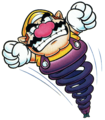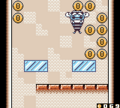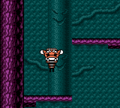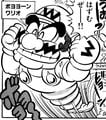Bouncy Wario
| Bouncy Wario | |
|---|---|
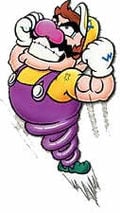 Artwork from Wario Land 4 | |
| Applies to | Wario |
| Item needed | Pogo Guy, Hammer-bot, Menhanmā, Hammer, chance wheel |
| Power(s) given | Bounce very high, reach otherwise inaccessible areas |
| First appearance | Wario Land II (1998) |
| Latest appearance | Wario Land 4 (2001) |
- “When a mallet hits my head, my long, toned legs turn into a spring! Not great, but it lets me jump amazingly high!”
- —Wario, Wario Land 4 instruction booklet
Bouncy Wario,[1][2] also known as Bouncing Wario[3] and Spring Wario,[4][5] is one of Wario's reactions in the Wario Land series of games. If hit by the hammer of a Pogo Guy, Hammer-bot and Menhanmā, or a hammer after it loses its spikes, Wario will be squashed and his legs turn into springs, only to spring right back up again in this state, used to spring to new heights. In all three versions, Wario has a time limit before he will return to normal (hitting a spike will also work). However, in Wario Land II and Wario Land 3, pressing will let Wario jump slightly higher, while in Wario Land 4, pressing
![]() will cause Wario to jump up until he hits an obstacle, allowing him to return to normal. When the time limit runs out, Wario will bounce one final time in the direction that he last moved.
will cause Wario to jump up until he hits an obstacle, allowing him to return to normal. When the time limit runs out, Wario will bounce one final time in the direction that he last moved.
Bouncy Wario has appeared in volume 28 of Super Mario-Kun. During a fight with Spoiled Rotten, when Wario is low on health, Arewo Shitain-hakase gives Hoggus a hammer. Hoggus then uses the hammer to hit Wario, transforming Wario into Bouncy Wario. Bouncy Wario then proceeds to defeat Spoiled Rotten. Wario also uses this form to defeat Golden Diva. Additionally, in volume 22, Wario hits Mario with a hammer, turning the latter into Bouncy Mario.
Profiles[edit]
Wario Land 4[edit]
- European instruction manual bio: "When a mallet hits my head, my long, toned legs turn into a spring! Not great, but it lets me jump amazingly high! I figure if I hit my head too much, my brain'll come out of my ears!! My brain's probably worth a lot of money! Just kidding!! Hey, stay away from my head!!"
- Nintendo 3DS Ambassador Program digital manual bio: "Press
to move and
to jump high."
Gallery[edit]
Artwork[edit]
Sprites[edit]
Screenshots[edit]
Miscellaneous[edit]
Names in other languages[edit]
| Language | Name | Meaning | Notes |
|---|---|---|---|
| Japanese | 跳ねる[6] Haneru |
Bouncing | Wario Land II |
| バネ[7] Bane |
Spring | Wario Land 3 | |
| ボヨヨーンワリオ[8] Boyoyōn Wario |
Bouncy Wario | Wario Land 4 | |
| Chinese (simplified) | 弹簧瓦力欧[9] Tánhuáng Wǎlì'ōu |
Spring Wario | |
| Dutch | Bouncy Wario[10] | - | |
| French | Wario à ressort[11] | Spring Wario | Wario Land 3 |
| Wario Rebondissant[12] | Bouncy Wario | Wario Land 4 | |
| German | Feder-Wario[13] | Spring Wario | |
| Italian | Wario Rimbalzante[14] | Boucing Wario | Wario Land II |
| Wario Rimbalzo[15] | Bounce Wario | Wario Land 4 | |
| Spanish | Wario Rebotante[16][17] | Bouncy Wario |
Trivia[edit]
- In Super Mario Galaxy and its sequel, Mario can use a similar form: Spring Mario.
- The way Wario looks in Bouncy form is similar to the way he looks after eating a Springo Candy in Mario Party 8.
References[edit]
- ^ 1998. Wario Land II instruction booklet. Nintendo of America (American English). Page 15.
- ^ 2001. Wario Land 4 instruction booklet. Nintendo of Europe (British English). Page 22.
- ^ Brady, Matthew K., Nathan Beittenmiller, Debra McBride, and David Cassady (February 5, 2001). Game Boy Game Secrets, 2001 Edition Prima's Official Strategy Guide. Prima Games (American English). ISBN 0-7615-3090-8. Page 95.
- ^ Fall 2001. Nintendo Power Advance Volume 3. Nintendo of America (American English). Page 52.
- ^ Nintendo.com (American English). Archived December 29, 2002, 07:28:52 UTC from the original via Wayback Machine. Retrieved May 31, 2024.
- ^ ワリオランド2. Nintendo (Japanese). Retrieved May 31, 2024.
- ^ Wario Land 3: Fushigi na Orgel Shogakukan guide. Shogakukan (Japanese). Page 7.
- ^ 2001. Wario Land Advance: Yōki no Otakara instruction booklet. Nintendo (Japanese). Page 28.
- ^ iQue (2004). 瓦力欧寻宝记 (Wǎlìōu xúnbǎo jì) instruction booklet. iQue (Simplified Chinese). Page 33.
- ^ Wario Land II Dutch Nintendo 3DS Virtual Console electronic manual, tab 11: "Aandoeningen".
- ^ Wario Land 3 European box descriptions
- ^ 2001. Wario Land 4 instruction booklet. Nintendo of Europe (French). Page 62.
- ^ 2001. Wario Land 4 instruction booklet. Nintendo of Europe (German). Page 42.
- ^ 1999. Wario Land II instruction booklet. Nintendo of Europe (Italian). Page 115.
- ^ 2001. Wario Land 4 instruction booklet. Nintendo of Europe (Italian). Page 122.
- ^ Official Wario Land 3 website. Guías Nintendo (European Spanish). Retrieved May 31, 2024.
- ^ 2001. Wario Land 4 instruction booklet. Nintendo of Europe (European Spanish). Page 102.
| Wario Land II | |
|---|---|
| Main characters | Wario • Captain Syrup |
| Supporters | Gull • Hen • Owl • Turtle |
| Bosses | Awabō • Big Kamukamu • Bobo • Cave master • Dunk • Ghost • Giant bee • Giant snake • Giant spear man • Mecha Kuri |
| Chapters | Chapter 1 • Chapter 2 • Chapter 2* • Chapter 2** • Chapter 3 • Chapter 3* • Chapter 4 • Final Chapter • Final Chapter* • Final Chapter** • The Really Final Chapter |
| Conditions | Ball • Bouncy Wario • Bubble Wario • Crazy Wario • Fat Wario • Flat Wario • Frozen Wario • Hot Wario • Puffy Wario • Tiny Wario • Zombie Wario |
| Enemies | Bee • Bird • Chūta • Cook • D-Bat • D.D. • Drill • Flame • Gaugau • Ghost • Grunt • Gugi • Inamazu • Kamukamu • Pecan • Penguin • Pirate Goom • Pogo Guy • Punch • Rooster • Tobī • Togemen • Tsuriuo • Utsutsubo • Weight • White puff • Wizard • Yukimaru • Zombie |
| Objects | 10 Gold Coin • 100 Coin • Alarm clock • Big Block • Bonfire Block • Brick • Coin • Doughnut block • Enemy Block • Ice block • Kotsuheri • Lance • Spike • Stove • Switch |
